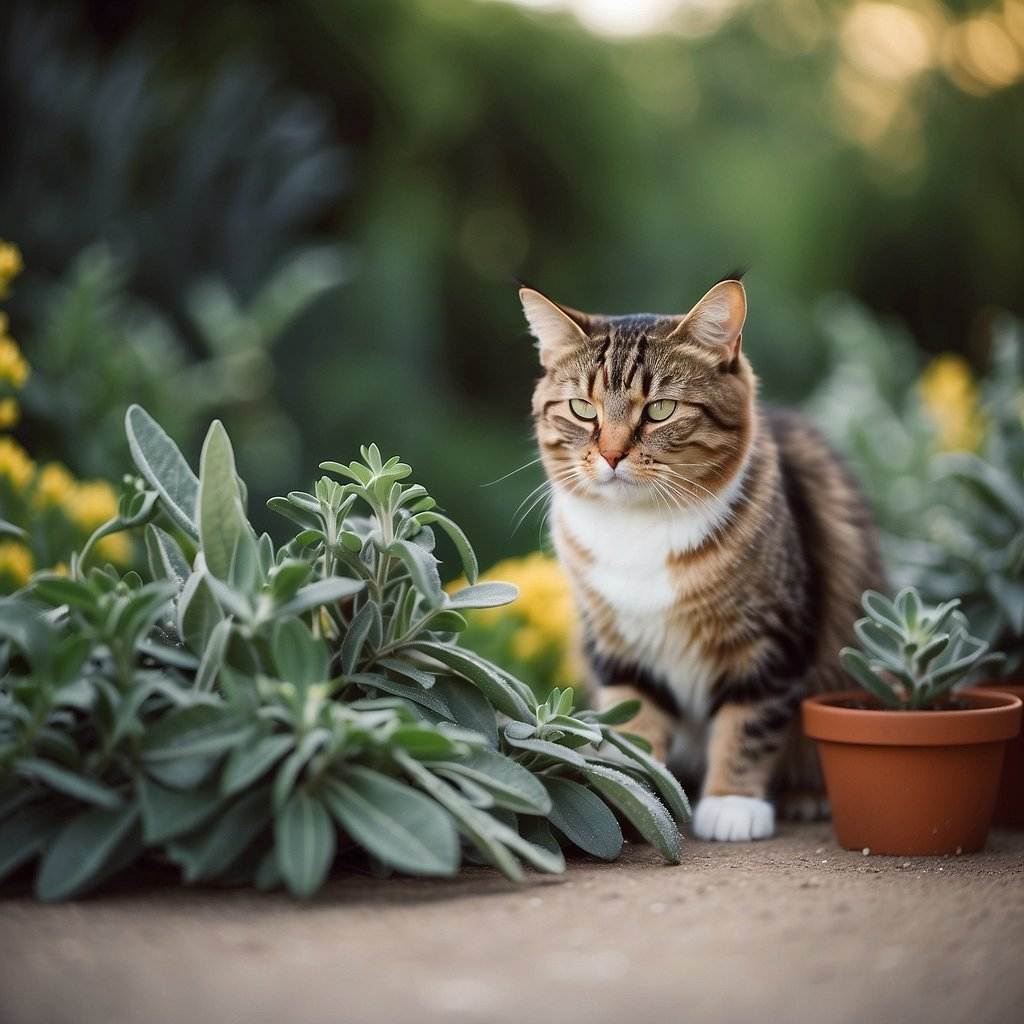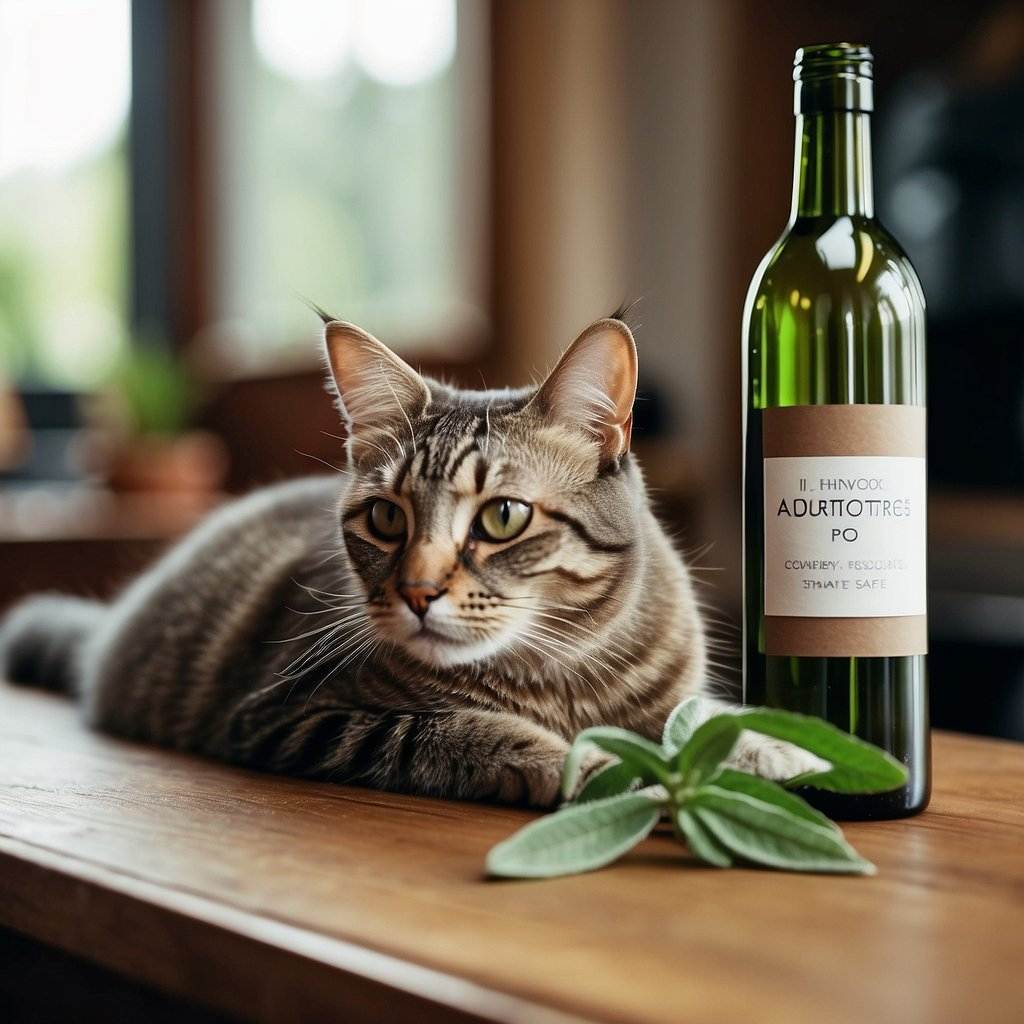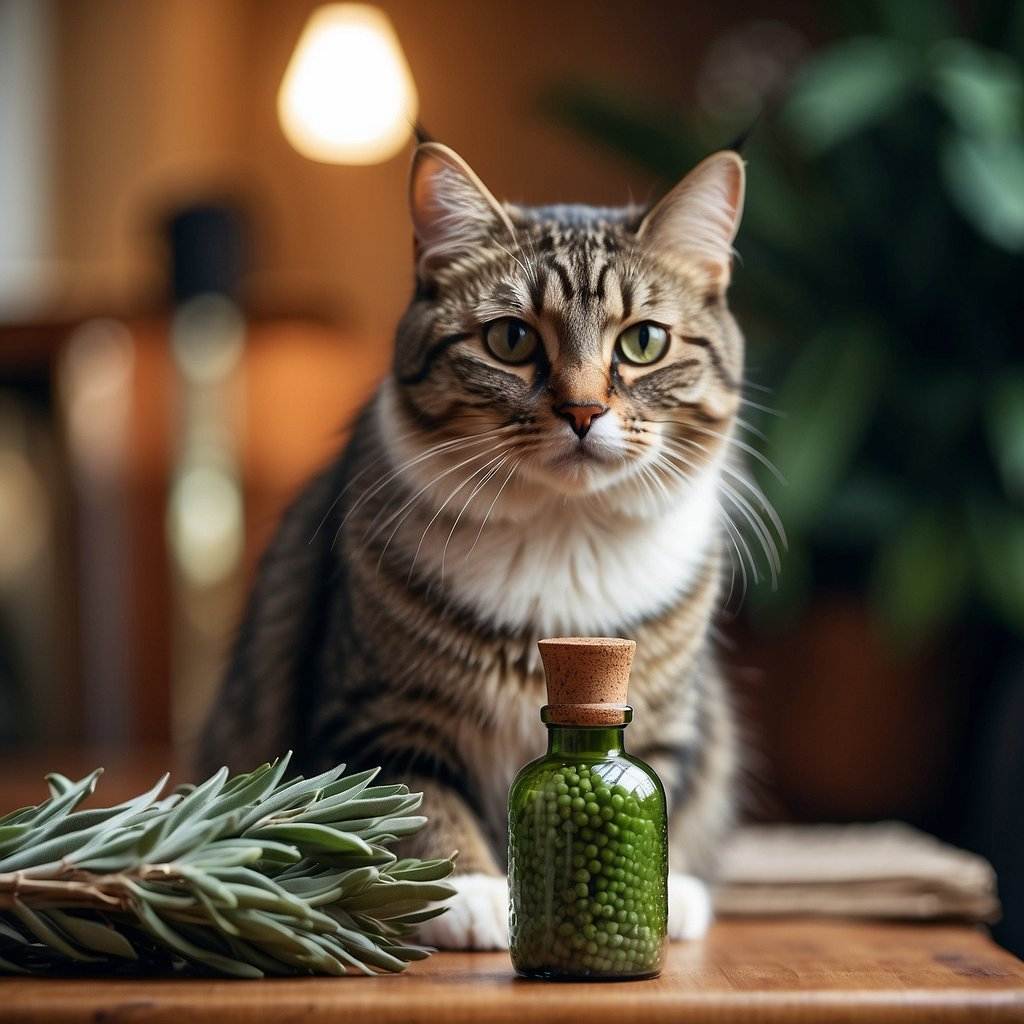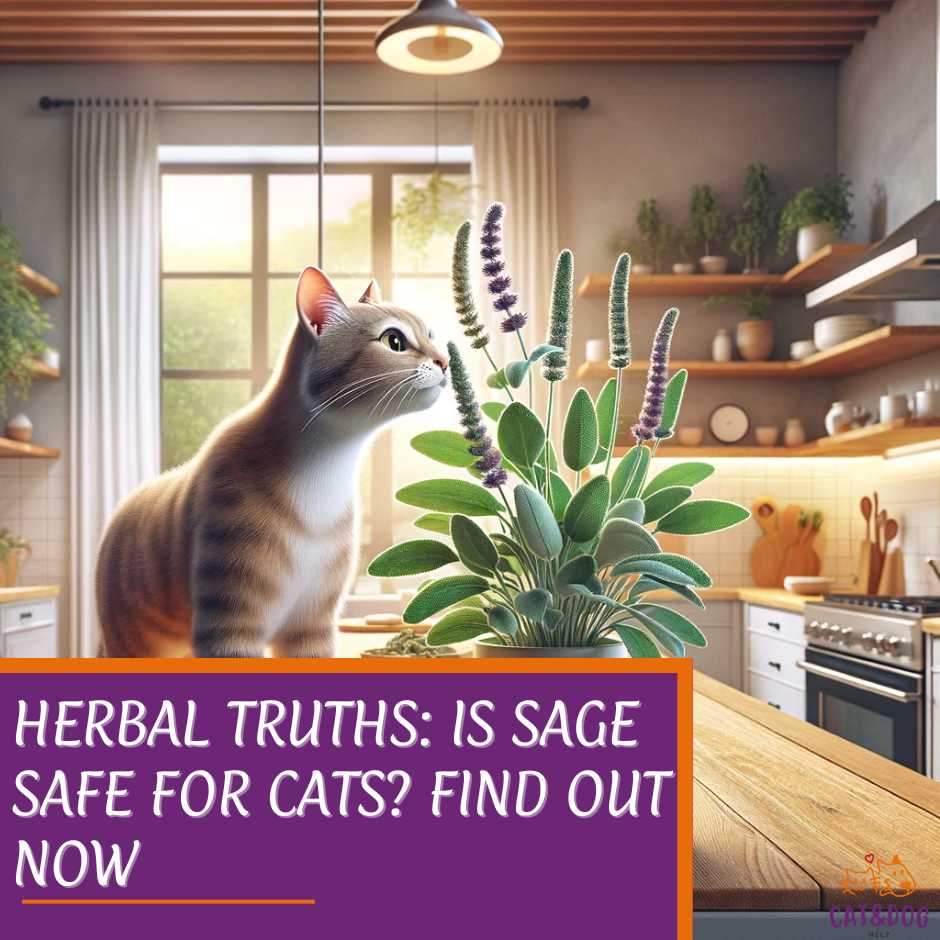As you lovingly gaze at your feline friend, you might wonder about the different herbs and foods that can either benefit or harm their health.
Your curiosity is crucial because not everything in your spice rack should find its way into your cat’s bowl.
So, let’s talk about sage, that fragrant herb you love to use in your dishes – is it something your kitty can enjoy too? Even some cat treats, including small amounts of sage, contain small amounts of sage.
If you use these treats, this might be why your cat likes your plant so much, but we still don’t want our kitties to freely feed on this herb.
So, is sage safe for cats?
Knowing what’s safe for your furball is particularly important, and sage often comes into question.
With experts weighing in and studies exploring the subject, we’re here to unpack whether this aromatic herb has a place in your cat’s life. (1)
Across the next few paragraphs, expect to sift through practical guidelines, and scientific perspectives, and answer the pressing question: can cats safely have sage, especially if they have known respiratory issues?
We’re lining up the facts without the feline fluff, and yes, we’ll keep the cat puns to a minimum.
Key Takeaways
- Sage is generally considered safe for cats when used in moderation.
- Expert opinions and research studies are valuable resources in understanding the effects of sage on cats.
- Practical advice helps navigate the inclusion of sage in a cat’s diet.
Understanding Sage and Its Effects on Cats
What is Sage? (2)
Have you ever sprinkled sage into your recipes or enjoyed its aroma from a sizzling pan? Sage, with its earthy and subtle peppery flavor, is an herb highly esteemed in cooking and traditional medicine.
Historically, it’s been a symbol of wisdom and immortality, finding its way into both kitchens and cultural lore. Sage, a wonderful herb to have in the house, as it’s delicious in several types of dishes and great for meats.
Plus, it has unique medicinal properties should you need to use it.
Cats’ Dietary Needs and Plant Consumption
As a cat owner, you know your feline friend is an obligate carnivore, right? This means their diet is predominantly meat. Cats often munch on grass or plants, which can have various effects on their health.
Some plants provide fiber or help with digestion, while others can be harmful.
Sage and Cats: A Complex Relationship (3)
So, about sage… While not toxic, sage does contain compounds like thujone that can cause health issues in cats. Too much of this culinary favorite could lead to:
- Vomiting
- Diarrhea
- Abdominal discomfort
- Lethargy
In more serious cases, these symptoms may escalate:
- Tremors
- Seizures
- Changes in the central nervous system
But it’s not all gloomy. In moderation, sage can offer anti-inflammatory benefits and aid in digestion. Just remember, what’s a pinch to you could be a heap to your tiny buddy.
While exploring the safety of sage for cats, it’s also essential for pet owners to be aware of other toxic plants for cats, ensuring a comprehensive approach to their pets’ health and safety.
How to Safely Share Sage
Want to offer sage to your cat? Take it easy, and start with a small amount. Keep an eye out for any adverse reactions – after all, you know your cat’s reactions better than anyone.
When in doubt, it’s always smart to check with your vet.
Now, while cats can be unpredictable connoisseurs, sage probably won’t make their top ten snacks list.
Incorporating sage into your cat’s diet should be done with an understanding of feline stomach care, ensuring that any addition supports their digestive health without causing discomfort or adverse reactions.
Their powerful noses might find the aroma of sage too strong, preferring simpler treats or their regular catnip indulgence.
If, for example, you want to give oil to your cat, you can try giving it coconut oil.
Nutritional and Health Implications of Sage for Cats

Have you ever wondered what’s in sage that could benefit your cat?
This aromatic herb isn’t just a fragrant addition to your kitchen; sage contains vitamins A and K, essential for maintaining good vision and blood health. (4)
Plus, it’s got minerals like calcium and iron, which are little health boosts for your kitty’s bones and blood.
Sage can also be a helper with digestion for your feline friend. Its anti-inflammatory properties may soothe your cat’s tummy and help with issues such as bloating and gas.
But hold on, before you start seasoning your cat’s dinner with this herb, it’s wise to remember that moderation is key. Sage, like many good things, comes with its risks when consumed in large quantities.
The essential oils in sage—thujone, camphor, cineole, and sage oil—can be a naughty bunch for your kitty if they’re overdone.
It’s important to note that sage oil should not be consumed by cats due to its potential toxicity.
What happens if your cat goes on a sage spree? Too much sage can lead to:
- Gastrointestinal upset
- Vomiting
- Diarrhea
Always think “less is more” and even consider having a chat with your vet to make sure you’re on the safe side when it comes to portions and your pet’s unique needs.
Remember, what’s a sprinkle for you could be a heap for your little furball!
Practical Guidelines and Real-life Applications
Ever thought about sprucing up your cat’s diet with some herbs? Sage might be on your list, but let’s walk through how to introduce it safely. (5)
Safely Introducing Sage to Your Cat’s Diet:
- Start Small: Begin with a tiny amount of sage. Think of it as a garnish, not a main ingredient.
- Observe: Keep an eye on your furry friend. Any sneezing or pawing at the mouth? These could be signs they’re not a fan—or worse, might be allergic.
- Increase Gradually: If all seems well after a few days, you can slowly increase the amount, but keep it minimal. Remember, cats are carnivores primarily.
Cats are curious creatures, aren’t they? But curiosity without caution can lead to trouble. Here’s what to do if you suspect your cat’s had a bit too much sage:
Recognizing and Managing Toxicity:
- Symptoms: Upset stomach, diarrhea, or lethargy could indicate a problem.
- Immediate Action: Stop offering sage and switch to their regular diet. Offer water to keep them hydrated.
- Veterinary Help: If symptoms persist or worsen, it’s time to ring up your vet. Better safe than sorry, right?
Remember, every cat is unique. If you’re not sure about herbs and your pet, have a chat with your vet.
They’re the experts and can give you advice tailored to your whiskered companion. Keep these tips in mind, and you’ll ace being a sage-savvy cat parent!
Expert Insights and Scientific Perspectives
When it comes to your feline friends, you’re right to wonder about what they can safely nibble on.
Veterinary Advice on Herbs in Cats’ Diets tells us that while cats are obligate carnivores, which means their bodies are designed to digest and use only animal-based proteins, a little plant matter isn’t necessarily off-limits.
Vets do say that sage and rosemary, the herbs you’re eyeing for tonight’s roast chicken, could potentially be part of your cat’s exploration without causing harm in small quantities.
But before you let Whiskers chow down on some sage leaves, let’s dig into what the experts say. Dr. Lauren Demos, DVM, asserts the importance of up-to-date veterinary research.
Although a snippet of sage isn’t likely to harm, it’s non-essential for their carnivorous diet. Are you curious about what the consensus is on the matter?
- Research and Studies on Sage:
- Very few scientific studies specifically target sage consumption by cats. However, sage is known to be a rich source of antioxidants and vitamins like K, A, and C, plus minerals such as calcium, iron, and magnesium.
That said, it’s essential to keep in mind that there’s a difference between something being non-toxic and being beneficial. With the lack of in-depth research on cats and sage, the best move is to play it safe.
If you do decide to treat your kitty to a sage experience, moderation is the keyword.
Remember, too, that each cat is an individual—what’s safe for one may not be for another.
Always watch for any adverse reactions whenever you introduce something new to their diet and when in doubt, get a vet’s opinion. Your furry friend’s well-being comes first!
Addressing Common Myths and Concerns
Have you ever heard someone say that all herbs are safe for cats because they’re natural? Let me tell you, that’s not quite right!
Sage, for example, may spice up your dishes, but it’s a bit of a grey area for your furry friend.
Here are a couple of myths busted about sage and cats:
- Myth 1: Cats can nibble on any plant, including sage, without any problems, however, some plant maybe can harm your cat.
- Fact: While sage is not highly toxic, ingestion of large amounts can cause upset stomachs in cats, leading to symptoms like vomiting or diarrhea.
- Fact: While sage is not highly toxic, ingestion of large amounts can cause upset stomachs in cats, leading to symptoms like vomiting or diarrhea.
- Myth 2: Burning sage is safe around pets since they aren’t eating it.
- Fact: Not exactly true. The smoke from burning sage can irritate your cat’s eyes and respiratory system. It’s similar to how we might react to heavy smoke from a campfire, annoying right?
Are you wondering how much is too much? Even moderate amounts of sage can cause neurological symptoms in cats, like tremors or seizures. So, play it safe!
And here’s a fun fact: not all parts of the sage plant are created equal. Essential oils and extracts from sage can be more concentrated and pose a greater risk. (6)
It’s like the difference between a strong espresso and a light tea – potency matters!
| Concern | What You Should Know |
| Sage Ingestion | May cause stomach upset and more; moderation is key. |
| Burning Sage | Could irritate your cat’s respiratory system; avoid it. |
| Sage Essential Oils | More risky than fresh or dried sage; best to steer clear. |
Remember, keeping the kitty safe is a top priority. So when you’re using sage, consider it like chocolate – okay for you but not a treat for your cat.
Keep an eye on your green pals and maybe opt for a cat-safe grass pot just for your purring roomie!
Additional Resources on Is Sage Safe For Cats?

Curious about your feline friend’s eating habits? You’re not alone! To dig deeper into the subject of cats and sage, check out these hand-picked resources:
- Veterinary Insights
- Get professional takes on cat nutrition:
- Healthy Herbs for Cats
- Wondering which herbs are safe? These guides are fantastic:
- Herb Toxicity in Cats
- Discover what to avoid and why:
Why not bookmark a few? They’re a treasure trove of information when deciphering the dos and don’ts of cat-safe herbs.
- Research Studies and Articles
- Love a good read? Here’s where scholarly articles come to play:
And remember, if you ever catch your kitty munching on something suspicious, it’s best to give your vet a quick buzz. Better safe than sorry, right?
Keep this list handy – your peace of mind and your cat’s health are worth it!
Quick Recap

Hey there, cat lover! Let’s run through what we’ve picked up about sage and our feline friends:
Is Sage Safe for Cats?
Absolutely, in small doses:
- Occasional Snacking: A nibble here and there on sage leaves – no biggie for your kitty.
- Essential Oils Caution: Sage does have essential oils like thujone and camphor. High amounts? Not great for cats.
How Much Sage is Too Much?
The exact quantity isn’t set in stone, but moderation is key. Cats are carnivores by nature, so herbs are more of a garnish than a main course.
Feeding Sage to Your Cat:
- Mix It Up: Infused in their food? It could be a fun twist. Just don’t go overboard.
- Watch for Signs: Each cat is unique. If yours has more of a reaction than a relaxed ‘meh,’ it might be time to rethink.
General Herb Guidance:
Herbs can be mysterious for cat diets. Interested in offering your paw pal something green?
- Go Slow: Introduce any herb, including sage, gradually.
- Monitor Closely: Keep an eye out for any unusual behavior or reactions.
- Vet Check-In: Unsure or worried? A quick chat with the vet can’t hurt.
Remember, treats are treats, and meat is the main event for any cat menu. Keep it simple, safe, and sage (pun intended!).
Frequently Asked Questions
When it comes to your curious cat’s safety around herbs, you might have a few questions. Let’s chew over some common inquiries about felines and their interaction with sage.
Can cats eat sage without any health issues?
Yes, cats can eat sage in small quantities since it’s not toxic to them.
However, it’s prudent to offer sage cautiously since some cats may have sensitive stomachs that could be upset by herbs.
Are there any oral health benefits to cats when chewing sage?
There’s no widely recognized oral health benefit for cats chewing sage. It’s more beneficial to stick to vet-approved dental care routines.
Can kittens have sage?
Like adult cats, kittens can ingest small amounts of sage. But be extra careful as their digestive systems are more delicate and prone to irritation.
Can the aroma of burning sage be harmful to cats or should pet owners be cautious?
You should be cautious when burning sage around cats. The smoke can irritate their respiratory systems, so ensure good ventilation if you do so.
Are there any long-term effects of feeding sage to cats?
There’s no evidence to suggest long-term effects from feeding sage to cats in moderation.
However, each cat is different, and what is benign for one may not be for another.
Can sage cause allergic reactions in cats?
While not common, allergies to sage can occur in cats.
Look out for signs of an allergic reaction such as itching, swelling, or difficulty breathing, and contact your vet.
How often can I give sage to my cat?
Sage should be given only occasionally and not as a regular part of your cat’s diet. When in doubt, consult with your veterinarian for personalized advice.


